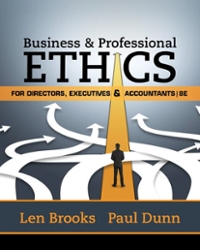On November 17, 2005, Conrad Black and three other executives1 of Hollinger International, Inc., were charged with
Question:
On November 17, 2005, Conrad Black and three other executives1 of Hollinger International, Inc., were charged with eleven counts of fraud with regard to payments allegedly disguised as “noncompete fees”
or, in one case, a “management agreement breakup fee” and the misuse of corporate perks. The payments were alleged to be a self-dealing “series of either secret or misleading transactions involving sales of a series of various newspaper publishing groups in the United States and Canada.”2 The sales involved several hundred newspapers and the alleged misdirection of over
\($80\) million of the proceeds.
Hollinger International, Inc. (International), a U.S. holding company traded on the New York Stock Exchange, had been built up by Black over the years to own hundreds of newspapers, including the Chicago Sun-Times, the Daily Telegraph in London, the National Post in Toronto, and the Jerusalem Post in Israel. Partly in recognition of his business acumen, in 2000, Black was knighted by Britain’s Queen Elizabeth and accorded the title of Lord Black of Crossharbour and the right to sit in the British House of Lords. Prevented from receiving the lordship by Jean Chrétien, then Prime Minister of Canada, Black resigned his Canadian citizenship to become a British citizen in order to accept the honor.
Black did not own the majority of Class A shares of International held by the public, but he (as CEO and principal owner) and his associates controlled it through their majority of ownership of the Class B shares that carried a 10–1 voting preference over the Class A shares. He and his associates owned 98.5% of Ravelston Corporation Limited, a private Canadian company with headquarters in Toronto, which in turn owned at least 70%ofHollinger, Inc., a Canadian holding company traded on the Toronto Stock Exchange.Hollinger, Inc. (Inc.), owned 30.3% of the equity (Class A and B) of International, which gave it and Black 72.8% of the voting power at International.3 This type of arrangement, which allows the control of a corporation with the ownership of less than a majority of the corporation’s equity, is known as “multiple-voting rights,” or
“super-voting rights.”........
Questions:-
1. What conflicts of interest may have been involved in Black’s activities?
2. Were Black’s noncompete agreements and payments unethical and/or illegal?
3. What questions should have been asked by International’s directors?
4. If the boards of directors of his various companies approved these noncompete agreements, are the board members on the hook and Black off?
5. Black controlled key companies through multiple voting rights attached to less than a majority of shares. Was this illegal and/or unethical?
6. What risk management techniques would have prevented Black’s potential conflicts from becoming harmful?
Step by Step Answer:

Business And Professional Ethics
ISBN: 9781337514460
8th Edition
Authors: Leonard J Brooks, Paul Dunn





